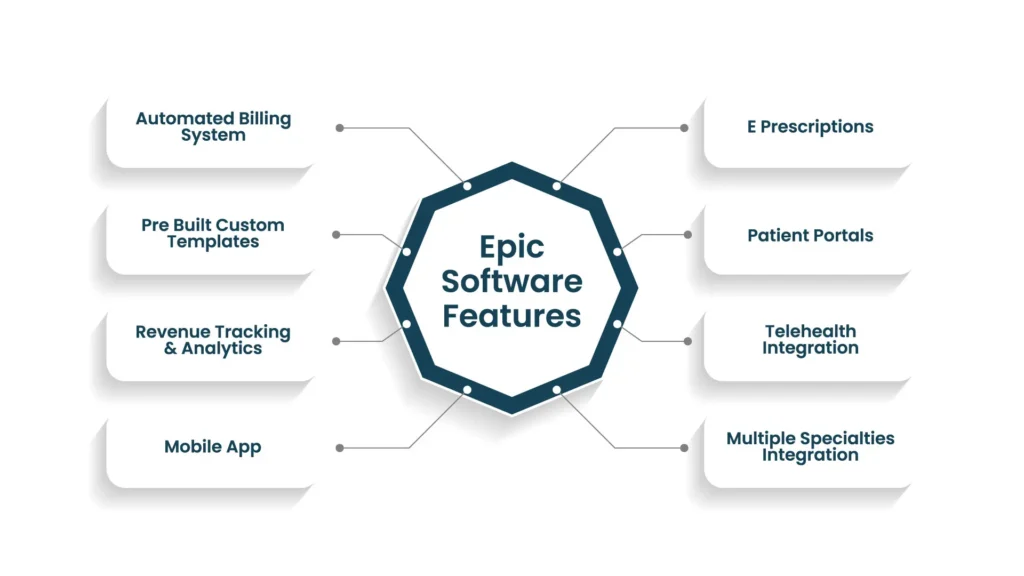
What is a PCA in Healthcare? All You Need to Know
What is a PCA in Healthcare? All You Need to Know As we start aging, living independently is not an easy task for many. Day-to-day

The healthcare industry is shaping itself, and with the introduction of technology, the landscape has changed. Healthcare providers are in need of secure, fast, reliable systems that can help them manage complex workflows.
EHR plays an integral role in patient health and the security of patient health; Providers can’t compromise when it comes to patient safety and security.
In this blog, we’ll take a look at Epic in Healthcare and how it is helping providers manage complex workflows.
Epic is a prominent healthcare IT company operating in the private sector, known for its development, support, and sale of Electronic Medical Record (EMR) software solutions on a global scale. This software is instrumental in maintaining patient medical records and is widely adopted, with a presence in over 60% of hospitals in the United States and serving more than 2.5 % of patients worldwide.
Epic’s software suite encompasses multiple crucial functions within healthcare systems, including Electronic Health Record (EHR) management, practice management, and billing software. These applications play a pivotal role in modernizing and streamlining healthcare operations, ultimately contributing to more efficient and effective patient care.
Epic’s widespread adoption and multifaceted capabilities make it a cornerstone of healthcare information technology, facilitating the seamless management of patient data, clinical workflows, and administrative processes.
Epic is a cloud-based EHR Solution that serves the needs of healthcare providers across multiple specialties. It is being used in a range of healthcare organizations, from small clinics to large hospitals.
Epic provides healthcare organizations with a range of solutions for managing patient care, such as Electronic Medical Records (EMRs), Clinical Decision Support (CDS) tools and Analytics Dashboards. It also offers patient portals, allowing patients to access their medical records online and communicate with their healthcare providers.

Epic has been the industry’s leading EMR provider for quite a long time and has completely revolutionized the healthcare industry so one the most commonly asked questions is, what is the experience of using Epic in healthcare? The Epic experience is when a healthcare provider uses the Epic software for his needs.
The epic experience gives healthcare providers a multitude of benefits, like more efficient and effective care delivery, improved clinical outcomes, cost reduction, and, most importantly, patient satisfaction.
Epic has been changing the process of how nurses work. It’s like a digital file system for patient information. With Epic, nurses can quickly find what they need on computers or mobile devices, reducing the time spent on paperwork and giving them more time to focus on patients.
Because Epic makes things easier, nurses can spend more time with patients. They don’t have to worry about paperwork as much. This means they can focus on taking care of patients, which is the most important part of their job.
Before nurses can use Epic, they need some training. There are two main parts to this training:
First, nurses go through training to learn how Epic works. It’s like learning the ABCs of the system. This helps them understand the basics.
After the basics, nurses get to practice using Epic in a hands-on way. It’s like learning to ride a bike by actually riding it. This helps them get really good at using Epic in real situations.
Epic wants to make sure everyone is using their system correctly. So, they say that healthcare organizations should get certified. This is like giving a stamp of approval to show that they’re doing things the right way.
Epic Systems offers a comprehensive suite of healthcare software modules, each designed to address specific aspects of healthcare management and patient care. Epic systems are highly customizable, allowing healthcare organizations to customize their Epic implementation to their unique needs.
EpicCare (EHR): EpicCare is the core Electronic Health Record (EHR) module, serving as the digital repository for patient medical records. It includes patient demographics, clinical notes, laboratory results, medication lists, and more.
MyChart: MyChart is a patient portal that enables patients to access their medical records, schedule appointments, request prescription refills, and communicate with healthcare providers securely.
EpicCare Ambulatory: This module is designed for outpatient settings like clinics and physician offices. It supports a wide range of clinical workflows, including appointment scheduling, e-prescribing, and clinical documentation.
Epic Willow: Willow is Epic’s pharmacy module, managing medication orders, dispensing, and inventory control.
Epic Radiant: Radiant is designed for radiology departments, enabling the management of imaging orders, scheduling, and reporting.
Epic Beacon: Beacon is an oncology module that assists in the management of cancer patients. It handles chemotherapy regimens, drug ordering, and patient monitoring.
Epic OpTime: OpTime is designed for perioperative departments, including surgical scheduling, anesthesia records, and intraoperative documentation.
Epic Cadence: Cadence is a scheduling and access management module allowing healthcare organizations to optimize appointment scheduling, resource allocation, and patient flow.
Epic Prelude: Prelude is the registration and access management module, streamlining patient registration and insurance verification processes.
Epic Resolute: Resolute focuses on revenue cycle management, including billing, claims processing, and reimbursement tracking.
Epic Beaker: Beaker is Epic’s laboratory information system, managing lab orders, specimen processing, and test results.
Epic Cogito: Cogito is Epic’s analytics and reporting module, providing tools for data analysis, reporting, and generating insights from patient data.
These are just a few examples of the extensive range of Epic modules available. The flexibility and interoperability of Epic’s software suite make it a valuable resource for healthcare organizations striving to improve patient care, streamline operations, and enhance overall healthcare management.
The software usually costs a lot; when we talk about EHR & EMRs, it costs even more. Epic software implementation & subscription price depend on several factors: the number of patients, total providers, specialties, and practice size.
Usually, the pricing of epic software starts from $1.2k and can exceed $500,000, depending upon the size of the practice. It also depends upon the extra modules you choose for your organization.
Epic provides both EHR (Electronic Health Record) and EMR (Electronic Medical Record) functionalities. It’s a comprehensive, integrated system that contains patient records, appointments, orders, billing information, test results, medical history and more.
Epic has become one of the most popular systems in healthcare because of its extensive range of software modules, its flexibility and interoperability, and its ability to help improve patient care. It has also proven to be an effective tool for streamlining operations and managing costs. Although the cost may seem steep, it’s important to consider all the benefits that come with using Epic software. In the end, it may be worth the investment.

What is a PCA in Healthcare? All You Need to Know As we start aging, living independently is not an easy task for many. Day-to-day

Lowering Hospital Readmissions with Telehealth and RPM Hospital readmissions are not only disruptive and stressful for patients but also costly for the healthcare system. According
Talk to an Expert Now